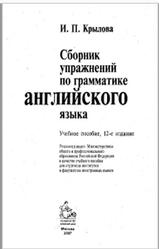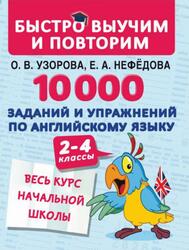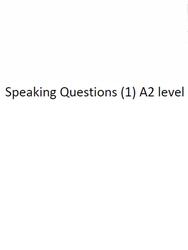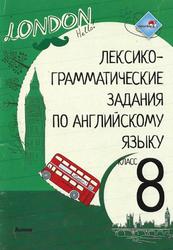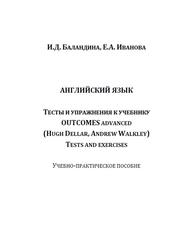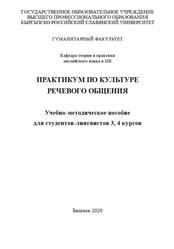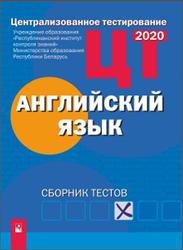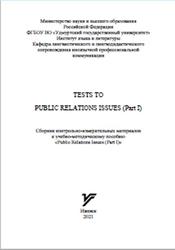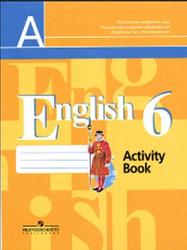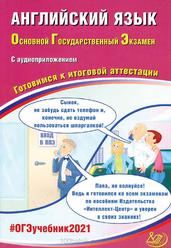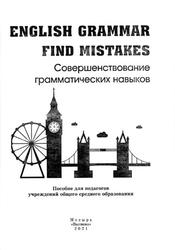Сборник упражнений по грамматике английского языка, Крылова И.П., 1978.
Сборник содержит упражнений, которые дают практический материал для усвоения курса грамматики, изложенного в учебнике Е. М. Гордой, Й. П. Крыловой «Грамматика современного английского языка» (М. «Высшая школа», 1974) Предложения н отрывки, которые служат материалом упражнений, ванты из современной английской и американской литературы и представляют собой образцы хорошего современного английского языка, типичного для него как по лексике так и по грамматическим структурам. Наличие ключей позволяет использовать сборник и для самостоятельной работы.
Предназначается для студентов институтов и факультетов иностранных языков.
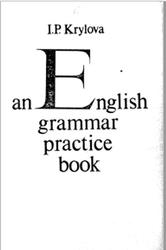
Примеры.
Explain why the Present Continuous is not used in the following sentences despite the fact that the actions in them take place at the moment of speaking:
1. The phone’s ringing. Who’s it for, I wonder? 2. You talk as if your son were a little boy. 3. Your scheme sounds full of holes to me. 4. There was a burst of laughter and music. Rose said wistfully: “They have a good time, don’t they?” 5. The whole thing must be done right away. That leaves us only one alternative. 6. What’s this? Sam, do you hear that? 7. What’s the matter now? Why do you talk to me like that? 8. I’m sorry. I apologize. 9. “I feel a bit shaken.” “You surprise me. I’ve never seen you like that.” 10. “Do you think there may be some mistake here?” “Why do you ask me?” 11. In a minute or two he began to sigh. “He sighs like a turtle,” Meg thought. 12. “She has gone away.” “Oh, that tells me everything.”
Translate the following sentences into English concentrating on the choice between the Present Indefinite and the Present Continuous to express actions taking place at the moment of speaking:
1. «Это моя ошибка. Я приношу извинения»,— сказал он. 2. Где лейтенант? — Да вон он там лежит, наблюдает за вражеским патрулем. 3. Я все еще не понимаю вас. 4. На перекрестке старик сказал торопливо: «Я покидаю тебя здесь. Я иду к дочери». 5. Я говорю тебе это в качестве предупреждения, Милли. 6. Он знает, что мы уходим? 7. Вы что, хотите мне сказать, что мой отец врун? — О нет, нет, молодой человек, вы преувеличиваете. 8. Что ты имеешь в виду, Сэм? Ты говоришь загадками. 9. Не будь так уверен в этом. Тебе это не идет. 10. Неужели ты не видишь, что я устал? Все, чего мне сейчас хочется — это сигарета и ванна. 11. Как ты чувствуешь себя сейчас? Почему ты не ешь суп? — Я не хочу. 12. Поль где-нибудь здесь? — Он принимает ванну. 13. Почему ты такой раздражительный? — Я не раздражительный. — Тогда не кричи.— Я не кричу.
Contents.
От автора.
The Verb.
Tense-Aspect Forms.
The Present Indefinite ami the Present Continuous (Ex. 1 —10).
The Present Perfect and the Past Indefinite (Ex. 11—15).
The Present Perfect Continuous and the Present Perfect (Ex. 16—21).
The Present Perfect and the Past Indefinite (Ex. 22—28).
The Present Continuous and the Present Perfect Continuous (Ex. 20—30).
The Present Perfect and the Present Indefinite (Ex. 31—32).
Revision (Ex. 33—34).
The Past Continuous and the Past Indefinite (Ex. 35—39).
Revision (Ex. 40—42).
The Past Perfect and the Past Indefinite (Ex. 43—45).
The Past Perfect Continuous and the Past Perfect (Ex. 46—49).
The Past Perfect and the Past Indefinite (Ex. 50}.
Revision (Ex. 51).
The Past tenses in sentence patterns (Ex. 52—61).
Revision (Ex. 62—66).
The Future tenses (Ex. 67—71).
Revision (Ex. 72—74).
The Future-in-the-Past (Ex. 75—76).
Revision (Ex. 77—78).
The Sequence of Tenses (Ex. 79—88).
Revision (Ex. 89—95).
Passive voice forms (Ex. 1—12).
Modal verbs.
Can (Ex. 1—8).
May (Ex. 9—14).
Revision (Ex. 15—16).
Must (Ex. 17-22).
Revision (Ex, 23—25).
Have to, be to (Ex. 26—30).
Revision (Ex, 31).
Ought, shall, should (Ex. 32—39).
Revision (Ex. 40).
Will, would (Ex. 41—42).
Revision (Ex. 43).
Need (Ex. 44-45).
Dare (Ex. 46).
Revision (Ex. 47—51).
Means of expressing unreality.
Forms of unreality in object clauses (Ex. 1—13).
Revision (Ex. 14).
Forms of unreality in appositive and predicative clauses (Ex. 15—16).
Forms of unreality in clauses of purpose {Ex. 17—20).
Forms of unreality in clauses of comparison (Ex. 21—23).
Forms of unreality in clauses of condition (Ex. 24—31).
Revision (Ex. 32— 33).
Forms of unreality in simple sentences (Ex. 34—39).
Revision (Ex. 40—42).
Verbals.
The infinitive and the ing-form as subject (Ex. 1—2).
The infinitive and the ing-form as predicative (Ex. 3—4).
The infinitive and the ing-form as part of a compound verbal predicate (Ex. 5-8).
The infinitive and the ing-form as a second action (Ex. 9—11).
The infinitive and the ing-form as direct object (Ex. 12—18).
The ing-form as prepositional object (Ex. 19—26).
The infinitive and the ing-form in sentences with “it” as a forma! subject and object (Ex. 27—31).
The infinitive and the ing-form as subjective predicative (Ex. 32—34).
The infinitive and the ing-form as objective predicative (Ex. 35—41).
The infinitive and the ing-form as adverbial modifiers (Ex. 42—46).
The infinitive and the ing-form as attributes (Ex. 47—56).
Revision (Ex. 57—59).
The participle (Ex. 60—64).
Revision (Ex. 65—67).
Nouns.
Articles.
The functions of articles (Ex. 1).
Articles with countable nouns modified by various attributes (Ex. 2—10).
Revision (Ex. 11—15).
Articles with generic singular and generic plural nouns (Ex. 16—17).
Articles with predicative nouns (Ex. 18—19).
Articles with nouns in apposition (Ex. 20—22).
Articles with nouns in some syntactic patterns (Ex. 23).
Revision (Ex. 24).
Articles with uncountable abstract nouns (Ex. 25—28).
Articles with names of materials (Ex. 29—30).
Revision (Ex. 31).
Articles with nouns denoting the parts of the day (Ex. 32—33).
Revision (Ex. 34).
Articles with nouns denoting seasons (Ex. 35—36).
Revision (Ex. 37).
Articles with names of meals (Ex. 38—39).
Articles with names of diseases (Ex. 40).
Articles with the nouns “bed", “school" and the like (Ex. 41).
Articles with some phraseologically used nouns (Ex. 42).
Revision (Ex. 43—47).
Articles with nouns indicating unique objects and notions (Ex. 48—49).
Revision (Ex. 50—54).
Articles with names of persons (Ex. 55—56).
Articles with geographic names (Ex. 57).
Articles with miscellaneous proper names (Ex. 58).
Revision (Ex. 59).
The place of articles (Ex. 60).
Revision (Ex. 61—63).
Adjectives (Ex. 1—3).
Pronouns (Ex. 1—16).
Key to the Exercises.
List of Books the Exercises Have Been Based on.
Бесплатно скачать электронную книгу в удобном формате, смотреть и читать:
Скачать книгу Сборник упражнений по грамматике английского языка, Крылова И.П., 1978 - fileskachat.com, быстрое и бесплатное скачивание.
Скачать файл № 1 - pdf
Скачать файл № 2 - djvu
Ниже можно купить эту книгу, если она есть в продаже, и похожие книги по лучшей цене со скидкой с доставкой по всей России.Купить книги
Скачать - djvu - Яндекс.Диск.
Скачать - pdf - Яндекс.Диск.
Дата публикации:
Теги: тесты по английскому языку :: английский язык :: Крылова
Смотрите также учебники, книги и учебные материалы:
Следующие учебники и книги:
Предыдущие статьи:

